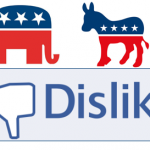 It’s fairly well known that at election time, the population doesn’t tend to share the same voting patterns and behaviors. Older people, for instance, tend to vote an awful lot more than younger people, which goes some way to explaining why so many policies are aimed at that demographic.
It’s fairly well known that at election time, the population doesn’t tend to share the same voting patterns and behaviors. Older people, for instance, tend to vote an awful lot more than younger people, which goes some way to explaining why so many policies are aimed at that demographic.
There have been various attempts to better engage with younger people however. Last year for instance, a new app was launched called Amy. Amy is an AI based app that users can message with questions around politics and receive an answer right away. It was designed to improve political understanding amongst younger people.
What of social media?
Despite accusations of slacktavism, social networks are usually a hotbed of political activity around election time. A paper from 2013 found that sites such as Facebook were abuzz with political discussions around the 2008 presidential election in America.
What’s more, engaging online wasn’t seen as a replacement for more ‘meaningful’ political engagement. Engaging politically online was not seen as a replacement for offline political engagement, but rather a new platform for talking about it with others. Users aren’t under the misapprehension that their online activities are influencing government in any way.
Social media as a news source
A recent study by academics at Penn State looked at how influential social media was as a source of soliciting political news.
“There seems to be growing concern that young people may be becoming more disengaged, particularly from mainstream media sources, and be more out-of-touch,” the researchers say.
“However, sharing and discussing news content on social media sites like Facebook can actually drive greater involvement with news and information.”
The researchers wanted to see just how engaged people were with stories they themselves had shared on Facebook. The results suggest that the engagement we receive from our friends plays a big part in how engaged we ourselves remain.
“One of the main findings of this study is that engagement in news stories through social media requires discussion with friends on the site,” the researchers say.
“Sharing the story does not increase involvement beyond just reading it on the original news website. Increased involvement depends on valuable feedback from friends.”
They went on to reveal that this feedback has to be substantial. Simply receiving likes is not enough, but if friends provide interesting commentary then it really helps to engage with the topic more deeply.
Our personal gatekeepers
The question then becomes whether when given more control over the news we consume, whether we tend to hunt down news that we agree with already, creating a kind of political echo chamber?
The perception is very much that those holders of extreme political opinions tend to be rather entrenched in their views, but recent research suggests that it is in fact those with moderate beliefs that are actually more susceptible to cognitive bias than their more extreme peers.
Indeed, another study goes as far as to suggest that those holders of more extreme positions (whether to the left or to the right) are actually smarter than their more moderate peers.
All of which suggests that those positions aren’t the result of blind heuristics but rather more measured thought and consideration. Of course, this is not without risk, as studies have also shown that the discussion of politics is one of the main reasons for de-friending someone, but maybe those aren’t the kind of ‘friends’ you’d want anyway?